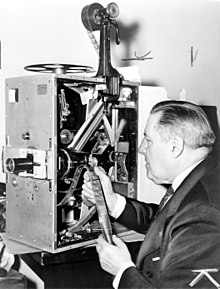Billy Bitzer
Johann Gottlob Wilhelm “Billy” Bitzer (often working as GW Bitzer ; born April 21, 1872 in Roxbury , Massachusetts , † April 29, 1944 in Hollywood , California ) was an American cameraman who worked for more than 900 Films stood behind the camera. He is considered a pioneering cameraman in film history and became famous primarily for his collaboration with director David Wark Griffith .
Live and act
Bitzer was a son of German immigrants. His father, Johann Martin Bitzer, who was born in 1843, came to the USA in 1868, where he died 16 years later. His son Billy began his professional career as a silversmith. From 1896 he worked for the film production company Biograph, initially as an electrician and then rose to become the company's chief cameraman. As a cameraman in the early days of film, Bitzer was constantly looking for new settings and spectacular shots and also took high risks. Among other things, he filmed so-called Phantom Rides from the "cow catcher" of a moving locomotive.
In 1908, Bitzer began working with David Wark Griffith , who was hired by Biograph as a writer and actor that year . When Griffith began directing, Bitzer and Griffith formed a team as cameraman and director that made film history. The films by Bitzer and Griffith, made by Biograph between 1909 and 1912 , set a standard that almost every cameraman and director tried to emulate.
When Griffith moved to Feature Film , he took Bitzer with him, who was the only cameraman in the production of Griffith's monumental work The Birth of a Nation (1915). Bitzer kept looking for new shots and ballooning for Griffith's film Intolerance (1916) to accommodate the complete Babylon set.
The Bitzer-Griffith collaboration finally ended in the 1920s, when Griffith, who had meanwhile founded his own production company, thought he could no longer get along with just one cameraman. Bitzer, who hardly received any offers in the early 1930s, made his last film Hotel Variety in 1933 and lived in a forced retirement for the next few years until he was hired for film research by the Museum of Modern Art in 1940 .
As early as 1926 he and Bill Miller - to the displeasure of the studio bosses - founded a union, the International Photographers of the Motion Picture Industries (IPMPI), and was twice its president.
In 1973, almost 30 years after Bitzer's death, his autobiography Billy Bitzer - His Story was published .
Filmography (selection)
- 1908: Falsely Accused!
- 1908: Old Isaacs, the Pawnbroker
- 1908: The Black Viper
- 1909: Edgar Allan Poe
- 1909: The Wheat King (A Corner in Wheat)
- 1909: The Gibson Goddess
- 1909: The Prussian Spy
- 1909: A Fool's Revenge
- 1909: The Roue's Heart
- 1909: Lines of White on a Sullen Sea
- 1909: And a Little Child Shall Lead Them
- 1908: The Deception
- 1909: Leather Stocking
- 1909: Lucky Jim
- 1909: A Burglar's Mistake
- 1909: The Lonely Villa
- 1909: A New Trick
- 1909: A Trap for Santa Claus
- 1911: Swords and Hearts
- 1912: To Unseen Enemy
- 1913: Judith of Bethulien (Judith of Bethulia)
- 1915: The Birth of a Nation (The Birth of a Nation)
- 1916 intolerance (Intolerance)
- 1919: Broken Blossoms (Broken Blossoms or The Yellow Man and the Girl)
- 1919: True Heart Susie
- 1920: Far to the east (Way Down East)
- 1922: Two Orphans of the Storm
- 1924: America
literature
- GW Bitzer, Beaumont Newhall: Billy Bitzer: His Story- The Autobiography of DW Griffith's Master Cameraman . ISBN 978-0-374-11294-3
Web links
- Billy Bitzer in the Internet Movie Database (English)
- Biography of Billy Bitzer on film-zeit.de
| personal data | |
|---|---|
| SURNAME | Bitzer, Billy |
| ALTERNATIVE NAMES | Bitzer, GW |
| BRIEF DESCRIPTION | American cameraman |
| DATE OF BIRTH | April 21, 1872 |
| PLACE OF BIRTH | Roxbury , Massachusetts |
| DATE OF DEATH | April 29, 1944 |
| Place of death | Hollywood , California |
